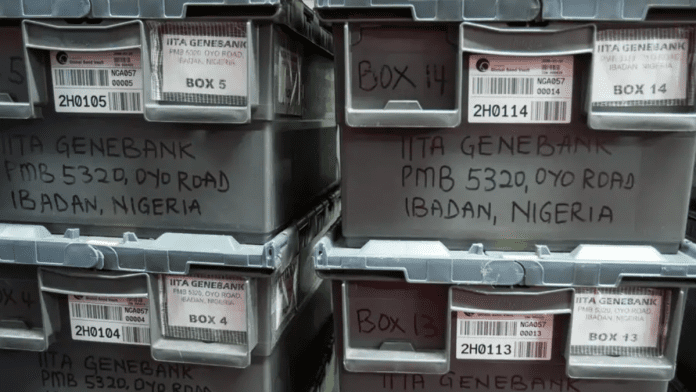News in brief:
-Â The Svalbard Global Seed Vault in Norway has received seeds of sorghum, cowpea, okra, beans and rice from Nigeria and Zambia.
– The vault contains 1.2 million seed samples and serves as a vital safeguard against global food crises and natural disasters.
Norway’s Arctic permafrost, the site of the Svalbard Global Seed Vault, is a sanctuary for precious plant seeds from around the world, including Africa, says a Deutsche Welle article. The unique facility serves as a vital safeguard against ‘doomsday-like’ global food crises and natural disasters.
Asmund Asdal, a Norwegian biologist responsible for overseeing the seed vault, to the German international broadcaster they have received 60 boxes of seeds from 15 seed banks around the world. He disclosed that the boxes are sealed, and they scan them meticulously through airport’s security-grade system to ensure they contain only seeds.
Among the latest visitors are Mayowa Olubiyi, a plant scientist from Nigeria, and Graybill Munkombwe, a colleague from Zambia, transporting seeds from Africa. Their luggage included cowpeas, sorghum, okra, beans and rice.
The African party told reporters that storing the seeds in the vault, among millions from around the world, means preserving their national heritage.
For 15 years, the vault has been working to preserve several plants’ DNA at a frigid -18 degrees Celsius. Its strategic location assures that the world’s food supply will not be completely wiped out, even in the event of a major global catastrophe.
As of last count, the vault contained a collection of 1.2 million seed samples. They include a diverse range of crops, including sorghum, wheat, beans, and maize. German vegetables have also recently been added to the vault’s vast repository.
The Svalbard Global Seed Vault stands as a testament to international cooperation and foresight in safeguarding the world’s food security. Its presence offers a glimmer of hope against the backdrop of peculiar challenges. These include, climate change, natural disasters, and other threats to global food production.



